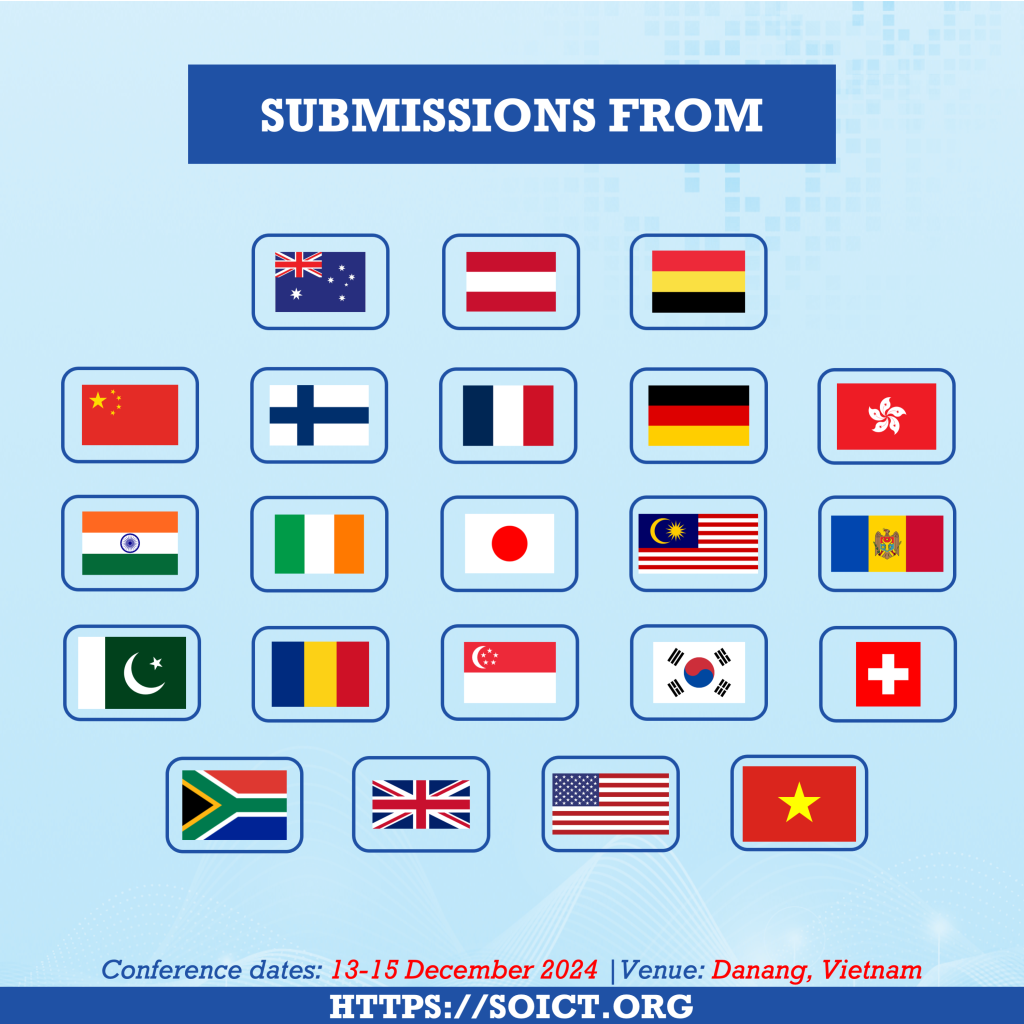Paper submission
Submission and Publication
The 2025 International Symposium on Information and Communication Technology (SOICT 2025) welcomes original, unpublished research papers describing theoretical, empirical, conceptual, or experimental work in Computer Science. Submissions must not be under review elsewhere during the evaluation process. The symposium language is English.
Manuscript preparation:
Papers must be formatted according to the Springer CCIS conference template (available in LaTeX or Word format). Detailed instructions and templates can be found at: Springer CCIS Instructions.
Submission system:
All papers must be submitted electronically via the EasyChair system.
Page limit:
Each paper is limited to a maximum of 12 pages (excluding references).
Review style:
SOICT 2025 uses a single-blind review process; author names and affiliations should be included in your submission. Each submission will be evaluated by at least three independent reviewers.
Publication:
Accepted and presented papers will be published in the Springer CCIS Proceedings, indexed by major databases such as Scopus, EI Compendex, and SpringerLink.
Code of Conduct:
Please refer to the Springer Nature Code of Conduct.
SUBMISSION PROCEDURE
- Register for an account on EasyChair if you do not already have one.
- Submit your manuscript to SOICT 2025 via the EasyChair system.
CONFERENCE SCOPE
Relevant topics include, but are not limited to:
Networking and Communication Technologies
- Network Architecture and Protocols, Future Internet, Software Defined Networking, Information Centric Networking
- Mobile and Wireless Networks, Ad-hoc and Sensor Networks, Internet of Things, Green Networking
- Network and Wireless Security, Privacy, Intrusion Detection/Prevention, Cognitive Radio, Optical Networks, and more
AI Foundations and Big Data
- Artificial Intelligence, Knowledge Representation, Machine Learning, Uncertainty, Search Methodologies, Information Retrieval
- Big Data Analytics: algorithms, systems, scalability, security, privacy, cognitive computing, cyber defense, e-health, business intelligence
AI Applications
- AI for Healthcare, Education, Finance, Agriculture, Transportation, and Smart Cities
- Real-world Deployment of AI Systems
- AI-based Decision Support Systems
- Explainable and Interpretable AI in Applications
- AI for Social Good
- Challenges in Scaling and Integrating AI Solutions
Multimedia Processing
- Image and Video Processing, Pattern Recognition, Computer Vision
- Speech Processing, Computational Photography, Information Visualization
- Cross-modal Fusion, Multimedia Content Understanding, Semantic Analysis, Social Media Analytics
Software Engineering
- Software Architectures, Formal Analysis and Design, Software Development Tools, Software Verification
- Programming Languages, Parallel, Distributed and Cloud Computing, Mobile and Ubiquitous Computing, Real-time Embedded Systems
- Applied Machine Learning for Software Engineering
Applied Operations Research and Optimization
- Optimization in Energy, Urban Traffic, Transportation and Logistics, Telecommunications, Manufacturing, Finance, Combinatorial Optimization, Integer Programming, Graph Algorithms
- Interactions between AI and Optimization
Human-Computer Interaction and Intelligent Systems
- User-centered design, Evaluation Methodologies, Multimodal Interfaces, Adaptive Interfaces, Dialogue Systems, AR/VR, Gesture and Touch Interaction, Social Computing, Accessibility, Human-Robot Interaction, Cognitive Modeling, Ethics and Privacy, Emerging Technologies
Recent Advances in Cyber Security
- System, Network, and Cloud Security, IoT Security, Web Security and Privacy, Security Analysis, Applied Cryptography, Digital Forensics, Adversarial Machine Learning
Lifelog and Multimedia Event Retrieval
- Lifelogging Devices, Data Acquisition and Representation, Event Detection, Content Analysis, Event-based Summarization, Machine Learning for Lifelog Analysis, Privacy, Personalized Systems, Applications in Healthcare, Education, Entertainment
Quantum Information
-
Quantum error correction
-
Quantum communication
-
Quantum algorithms
-
Quantum cryptography
-
Quantum simulation
-
Fault-tolerant quantum computing
-
Intersection of quantum information and machine learning
REQUIREMENTS
- Papers must strictly follow the LNCS/CCIS format rules.
- All submissions must be in PDF format and should not include page numbers.
- Templates are available: Latex template and Word template
For any questions or clarifications regarding the submission process, please refer to the conference website or contact the Organizing Committee.

